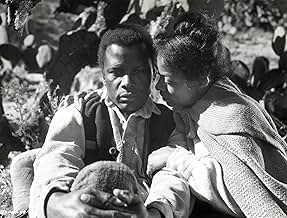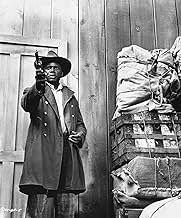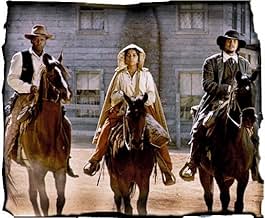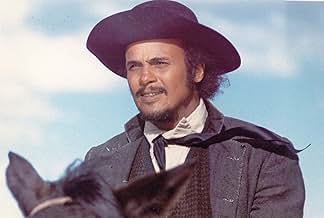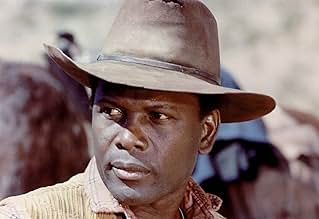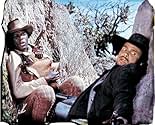IMDb RATING
6.6/10
3K
YOUR RATING
A wagon master and a con-man preacher help freed slaves dogged by cheap-labor agents out West.A wagon master and a con-man preacher help freed slaves dogged by cheap-labor agents out West.A wagon master and a con-man preacher help freed slaves dogged by cheap-labor agents out West.
Kenneth Menard
- Little Henry
- (as Ken Menard)
Featured reviews
It's shortly after the abolition of slavery and Black people all over the south seek greener pastures where they don't have to be subjected to Jim Crowism. Some would head west with a wagon master showing them the way. And sometimes the greedy white people of the south wouldn't want to let their labor go so they'd send night riders after them to bring them back.
Buck (Sidney Portier) is a wagon master leading a group west. The Preacher (Harry Belafonte) is an opportunistic shuckster who finds himself a part of the Buck-led wagon train. The two of them have to be heroes in a sense in order to get this wagon train west.
I really appreciate this movie being made in the 70's when so many blaxploitation films were made. Instead of pimps, hoes, hustlers, and drug dealers, this movie is about positive black male figures in a western. Besides the terrible movie, "Posse," with Mario Van Peebles, I hadn't seen a Black western. I liked the history this movie presented (however dramatized), what it stood for, and the actors in it. Yes, I have seen better westerns--meaning more entertaining--but I can't readily recall a more significant western.
Buck (Sidney Portier) is a wagon master leading a group west. The Preacher (Harry Belafonte) is an opportunistic shuckster who finds himself a part of the Buck-led wagon train. The two of them have to be heroes in a sense in order to get this wagon train west.
I really appreciate this movie being made in the 70's when so many blaxploitation films were made. Instead of pimps, hoes, hustlers, and drug dealers, this movie is about positive black male figures in a western. Besides the terrible movie, "Posse," with Mario Van Peebles, I hadn't seen a Black western. I liked the history this movie presented (however dramatized), what it stood for, and the actors in it. Yes, I have seen better westerns--meaning more entertaining--but I can't readily recall a more significant western.
Poitier plays Buck, one of few blacks who are qualified to be wagonmasters. It is after the Civil War and he is helping escort former slaves into the west. This is not an easy task. They face nature, bounty hunters, racist settlers, robbers, and Indians. The movie is brutally honest with the hatred that these brave men and women faced, but the film has a strong sense of hope. They are not quitters, they raise money workers for sharecroppers along the way. Harry Belafonte has the most colorful role as The Preacher - a reformed thief who befriends Buck when given no one else to trust. The movie is bleak, yet hopeful, well-acted, and exciting. It deserves to be remembered with the best of westerns from that era. Much more historical importance than its predecessor, "Butch Cassidy and the Sundance Kid" with its sappy, happiness and handsome boy wonders. And Poitier rivals George Roy Hill as a director any day. Cool folksy-jazz score. Recommended to anyone who enjoys a fresh, historical angle with their westerns.
It regards a trail guide and a con preacher join forces to help a wagon train of former slaves who are escaping from cutthroats and seeking to homestead out the West . The civil war was over and by law the slaves were freed . But when the promise of land and freedom was not honored , many ex-slaves journeyed out of the land of bondage in search of new frontiers where they could be free at last . They placed their hopes in the hands of the few black wagonmasters that knew the territories of the west . None of this came easy , for not only did they have to overcome hostile wilderness , but nightriders and bounty hunters were hired by persons unknown to hunt them down and turn them back to the Southern fields . This picture is dedicated to those men , women and children who lie in graves as unmarked as their place in history . This movie deals with a hard , long travel throughout the wilderness of a group of negroes and slaves freed after the end Civil War , being led by an intrepid wagonmaster (Sidney Poitier) along with a roguish preacher (showy acting by Harry Belafonte) wielding a peculiar Holy Bible . And being harassed by marauding white nightriders (led by Cameron Mitchell) all the way down .
Sidney Poitier performed and shot this picture , delivering it all the traditional ingredients of amusement : Riding pursuits , spectacular battles , croosfire , bank assaults , ambushes , fights with Indians , and many other things . While at the same time inserting a thought-provoking issue of accusatory coment on the ill-treatment of the ancient slaves whose graves are as unmarked as their place place in history . It has an interesting subject which is rather reminiscent of John Ford's Wagonmaster played by Ben Johnson in similar role to Poitier . Nice , though , the idea of having Indians riding and coming to rescue of the wagon train besieged by bandits , it is a gem , instead of the ordinary Union cavalry . Harry Belafonte steals the show giving an overacting and Poitier the player seems content to stand back and let the limelight falls on Harry . It is agreeable , enjoyable , and pleasant enough , but somewhat it never quite clicks , despite awesome interpretations from Belafonte and Poitier . Ruby Dee also provides a decent playing , she interprets the attractive spouse of Sidney .
The motion picture was professionally directed by Sidney Poitier . Being his fiilm debut that he took over the job from Joseph Sargent who left the filmmaking . Poitier is a fine actor and filmmaker . Poitier's talent, conscience, integrity, and inherent likability placed him on equal footing with the white stars of the day. He took on directing and producing chores in the Seventies, achieving success in both arenas . Sidney directed a few pictures , and most of them were comedies . As Poitier made : Ghost dad , Fast forward , Hanky panky , Stir Crazy , Piece of action , Let's do again , Uptown Saturday night , and this Buck and the preacher . Rating : 6/10 , passable and aceptable Western movie
Sidney Poitier performed and shot this picture , delivering it all the traditional ingredients of amusement : Riding pursuits , spectacular battles , croosfire , bank assaults , ambushes , fights with Indians , and many other things . While at the same time inserting a thought-provoking issue of accusatory coment on the ill-treatment of the ancient slaves whose graves are as unmarked as their place place in history . It has an interesting subject which is rather reminiscent of John Ford's Wagonmaster played by Ben Johnson in similar role to Poitier . Nice , though , the idea of having Indians riding and coming to rescue of the wagon train besieged by bandits , it is a gem , instead of the ordinary Union cavalry . Harry Belafonte steals the show giving an overacting and Poitier the player seems content to stand back and let the limelight falls on Harry . It is agreeable , enjoyable , and pleasant enough , but somewhat it never quite clicks , despite awesome interpretations from Belafonte and Poitier . Ruby Dee also provides a decent playing , she interprets the attractive spouse of Sidney .
The motion picture was professionally directed by Sidney Poitier . Being his fiilm debut that he took over the job from Joseph Sargent who left the filmmaking . Poitier is a fine actor and filmmaker . Poitier's talent, conscience, integrity, and inherent likability placed him on equal footing with the white stars of the day. He took on directing and producing chores in the Seventies, achieving success in both arenas . Sidney directed a few pictures , and most of them were comedies . As Poitier made : Ghost dad , Fast forward , Hanky panky , Stir Crazy , Piece of action , Let's do again , Uptown Saturday night , and this Buck and the preacher . Rating : 6/10 , passable and aceptable Western movie
Sidney Poitier made his directorial debut with "Buck and the Preacher", in which he played a wagon-master leading freed slaves across the Old West. The whole time, they have to battle night-riders trying to return them to slavery in Louisiana. But then, Poitier joins up with Harry Belafonte, a reformed thief spreading the Gospel across the Old West, and they figure out a way to protect the freed slaves.
Probably the most important aspect of this movie was that it came out around a time when Hollywood was releasing many blaxploitation movies portraying African-Americans as kick-ass brothers and sisters with hearts of gold. This one focused seriously on a part of black history in the United States, and did a very good job at it. I certainly recommend this movie. Also starring Ruby Dee and Denny Miller (a character actor who appeared twice on "Gilligan's Island").
Probably the most important aspect of this movie was that it came out around a time when Hollywood was releasing many blaxploitation movies portraying African-Americans as kick-ass brothers and sisters with hearts of gold. This one focused seriously on a part of black history in the United States, and did a very good job at it. I certainly recommend this movie. Also starring Ruby Dee and Denny Miller (a character actor who appeared twice on "Gilligan's Island").
We tend to forget that in 1972, in the heart of the whole "blaxploitation" movement, that the very idea of casting African-Americans in traditional white roles was daring in and of itself. As such, Buck and the Preacher, starring Sidney Poitier (who also directed) and Harry Belafonte in the titular roles must have created quite a stir upon its release. The story is pretty standard for a western--a wagon train heading west, led by a tough-as-nails trail guide, is harassed by outside forces (usually bandits or American Indians), but in this case, the settlers are all freed slaves, and the "outside forces" are hired guns by the south, bend on stopping every black settler group, destroying their supplies (and murdering a few of their people), thus terrorizing them into returning to the plantations. Former military sergeant Buck (Poitier) will have none of that, and the slick-talking con man "Preacher (Belafonte), whose initial intentions may seem questionable, mans up and does the right thing, joining forces with Buck for a typical final showdown. A fun western, to be sure, but if you're looking for deeper social commentary that what has already been described, you won't find it. A traditional western with an African-American cast is daring as it gets in 1972, but don't let that keep you away. The original score by Benny Carter, heavy on the mouth harp and that weird pig-sounding instrument they use on Green Acres, will annoy the hell out of you yet stay with you for days.
Did you know
- TriviaOn the advice of his future wife Joanna Shimkus, Sidney Poitier took over directorial duties from Joseph Sargent when he became dissatisfied with the film's point of view. As a result, this turned out to be Poitier's debut behind the camera and he would go on to direct eight more pictures.
- GoofsWhen Ruth blows out the flame in the lantern, there is a slight delay before the light goes out in the cabin and then another slight delay before the "moonlight" comes up.
- Quotes
Buck: Which way are you ridin', Preacher?
The Preacher: Well, that's not exactly settled in my mind yet.
Buck: Well, you got three possibilities.
The Preacher: Oh?
Buck: North, south or east.
The Preacher: What happened to west?
Buck: We're going west.
- Crazy creditsOpening credits prologue: The Civil War was over and by law the slaves were freed. But when the promise of land and freedom was not honored, many ex-slaves journeyed out of the land of bondage in search of new frontiers where they could be free at last.
They placed their hopes in the hands of the few black wagonmasters that knew the territories of the West.
None of this came easy, for for not only did they have to overcome a hostile wilderness, but nightriders and bounty hunters were hired by persons unknown to hunt them down and turn them back to the fields.
This picture is dedicated to those men, women and children who lie in graves as unmarked as their place in history.
- ConnectionsFeatured in The Dick Cavett Show: Episode dated 1 May 1972 (1972)
- How long is Buck and the Preacher?Powered by Alexa
Details
Box office
- Budget
- $2,000,000 (estimated)
- Gross worldwide
- $2,762
Contribute to this page
Suggest an edit or add missing content



